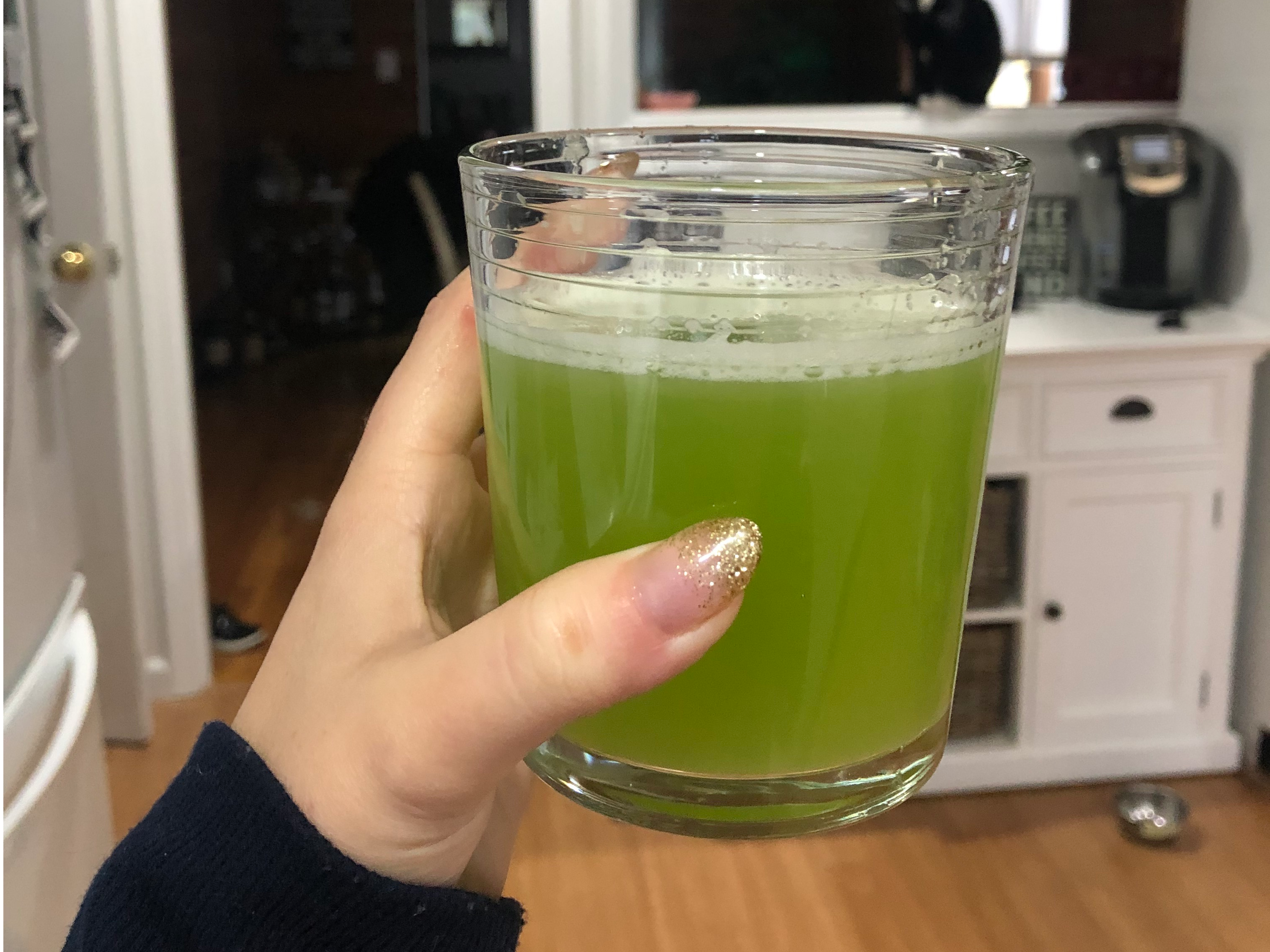- Drinking celery juice on an empty stomach, first thing in the morning is a new fad.
- It is all over Instagram with people claiming that it leads to a host of health benefits.
- I talked to a registered dietitian about whether or not it has actually known benefits.
- I tried it for a week but couldn’t get through the whole seven days and had to stop after six.
There’s a good chance that, in the last few weeks, you’ve seen at least one person on Instagram drinking a glass of the bright green liquid. Drinking a glass of celery juice each morning is the latest fad that has taken over health bloggers and Instagram feeds – if you look up the tag #celeryjuice on Instagram, you’ll find more than 100,000 posts.
The concept is simple: you drink juiced celery on an empty stomach every morning when you wake up. It’s not entirely clear where it originated from, but it’s possible that, like many similar health trends in the past, it came from Gwyneth Paltrow’s Goop. The list of benefits that come with it is extensive and hard to ignore.
Goop calls it a “miracle juice,” claiming it can restore health to those with chronic illnesses, especially digestive issues. Kim Kardashian drinks it for her psoriasis. The Chalkboard says it can cleanse your thyroid, detox your liver, calm your nervous system, and act as an anti-inflammatory. Posts on Instagram promise it will deliver glowing skin helps with weight loss, and can even fight cancer.
Basically, if you read everything about celery juice out there, you too would assume it’s a ‘miracle juice’
But does it really deliver on all of these promises? I wanted to try it out for myself.
As someone with ulcerative colitis, a chronic digestive disorder that has the power to make my life pretty miserable, I was first attracted to the idea of celery juice because of all of the claims that it helps with gut health if you drink it on an empty stomach. I'm willing to try anything on that front. Plus, it seemed simple enough to do on my own, and I love celery.
But what do experts think about it? Since I was unclear on why it had to be done on an empty stomach, I spoke to Rachael Hartley, RD, LD, Certified Intuitive Eating Counselor. When I asked her if it really does make a difference when it comes to gut health, she said, "There's no research to support the idea that drinking celery juice on an empty stomach helps with digestion. Most of the digestive health claims I found cited a rat study that was done using celery extract to treat gastric ulcers, but it's a big leap to say that means drinking celery juice will help with digestions in humans!"
In fact, Hartley said that drinking it on empty stomach might actually hurt digestion. She explained, "Our gut generally does best getting fed real food consistently throughout the day to stimulate digestion."
That didn't sound very promising, but I decided to find out for myself. So I bought my celery and went into the experiment with an open mind.
Making celery juice is super simple
The process of making celery juice is easier than it seems. It's literally just celery and maybe water. After looking around on Instagram, I found that many health bloggers made it by mixing three to four large celery stalks with about a half cup of water, maybe more, which makes about eight ounces. The first morning, I washed and chopped three very large stalks.

If you have a juicer, you can simply put the full stalks through, and get your juice from there. If you don't have a juicer, you can blend the chopped celery with water in a high-speed blender. I don't have a juicer, so I relied on my blender.

I blended it on medium-high for maybe two to three minutes, until I was satisfied with the mixture, and that was it. The result in the blender was a frothy, greenish-white drink that looked, well, not that appetizing, to be honest.
I poured it into a glass anyway, dedicated to my little project (and determined not to waste the money I had spent on bunches of celery), and took a tentative sip. My immediate reaction went something like, "Oh my God, NO."

As I forced myself to drink on, I discovered that my problem wasn't with the juice itself, but the foam part on top. Blending the juice led to a white foam that had a horrible texture and just tasted … gross. I don't even know how to explain it, but it wasn't good. It turned me off so much that I ended up scooping out the foam and drinking just the juice, which was much better. It just tastes like celery in juice form.
A few hours later, I found that I really didn't feel any different
I don't know what I expected from my first glass of celery juice. I had read about bloggers who said they drank it instead of tea or coffee because it gave them so much energy, but this definitely didn't happen for me. I don't know if it's because I rely on caffeine as a life force or because it just legitimately doesn't give you energy (I'm going to go with the latter), but I still needed my caffeine fix.
In fact, I even had an ulcerative colitis attack that day
Since my U.C. attacks (which include a whole host of fun gastrointestinal symptoms I won't bore you with) are quite unpredictable, I honestly don't know if it was the celery juice that brought it on or something else. Celery is generally considered OK for anyone suffering from Irritable Bowel Syndrome (which is similar to what I have), but I've personally found that raw greens in general, for me, are difficult to digest and often bother my stomach a lot. Whatever the case, I didn't feel fantastic after the juice, and that was kind of the worst. Still, I went on with my experiment.
To make the juice better the second day, I bought a tiny strainer
The foam on my juice freaked me out so much that I decided to get rid of it completely, and I knew there had to be a better way than scooping it out with a spoon. I went to the grocery store and bought a tiny strainer, which I put over my glass. I slowly poured the juice through the strainer, and it collected the icky foam on top for me.

Drinking the celery juice sans foam was a much better taste experience. I actually enjoyed it, probably because I do really love celery. And I even found the neon green shade to be kind of fun.
Still, my gut results were not great that day either
Since my U.C. attacks often last a few days, I wasn't surprised to find that I still wasn't feeling great that day, and my celery juice on an empty stomach didn't seem to help. That was a major bummer, and I started to feel like it was my body's way of saying, "hey, this doesn't work for you!"
And, according to Hartley, there are plenty of other, better, alternatives to celery juice. She told me, "Celery is in the same food family as fennel, parsley, and anise, which all contain compounds that promote gut mortality. Personally, a little fennel tea (or ginger) sounds tastier to me!"
By day 3, I was starting to question the true efficacy of this drink
When I posted about my celery juice on an Instagram story, one follower direct messaged me to ask, "What's the difference between juicing it and just eating raw celery?" I was stumped because I didn't know. I had only read that it was better to juice it. Medical medium Anthony William told Goop that when you juice celery, it removes the pulp (fiber), and he believes "its healing benefits become much more powerful, especially for someone with chronic illness." He also added that you can get more of it when you juice it than you would by eating it.
Still, I suddenly felt skeptical. Hartley seemed to agree with me, saying that you would get those same healthy compounds out of celery by eating it. When I asked her the difference in juicing celery, she said, "It tastes more disgusting? Really, you get the same nutrients from eating celery, although from juicing, you are able to consume more celery in a sitting. However, with juicing, you lose beneficial fibers that are so helpful for digestion."
On day 5, I felt … worse

By mid-week, I had perfected the art of making celery juice, but my body was basically like, "dude, what are you doing to yourself?" My U.C. attacks had gotten worse, and the only constant was drinking the celery juice. Again, this was an isolated "experiment," and I still don't know if it was the celery juice, a different trigger, or a mixture of things. But I did know I didn't feel well. Plus, I was starving every morning, since you drink it on an empty stomach and then have to wait nearly an hour before eating.
I also didn't experience any of the other benefits I had heard about: glowing skin (I looked the same), more energy (definitely not), and better gut health (at this point, that was laughable). It's impossible to tell if I experienced the cancer-fighting, heart-helping benefits I had read about as well, and I just somehow doubt they were taking place.
I felt slightly defeated at realizing this was not a miracle juice at all. Why did everyone else feel great after it and I felt nothing?! Hartley kept it simple: "The placebo effect can be very powerful!" She added, "I have no doubt that many people legitimately feel like celery juice has boosted their energy or immune system or is making their skin glow. As gross as celery juice must taste if I thought all these things were true, I'd suck it down as well! But biologically, it's just not possible for the juice of food to have such miraculous benefits."
By day 6, I had to give up the challenge
At the end of the week, my U.C. attack was still growing strong, and when I woke up, my body wanted carbs and not raw celery. So, I gave up the celery juice. Not only was it not working, but I didn't feel well, and it just wasn't worth it.
That said, there are actual benefits to consuming celery. Hartley said, "Celery contains a nice dose of vitamin C and folate, and its high water content makes it extra hydrating in the summer. But celery doesn't have any magical curative properties! While celery is a perfectly nutritious addition to a balanced diet, no single food has the ability to completely transform health."
The verdict? I don't think celery juice is worth it
Listen, if buying bunches of celery every week and juicing it makes you feel great, then, by all means, go for it. But for me, it didn't do anything, and it's entirely possible that it brought on an ulcerative colitis attack. I wouldn't try it again, and I'm inclined to believe Hartley on this one: celery juice is just another weird health trend, and not a miracle.

